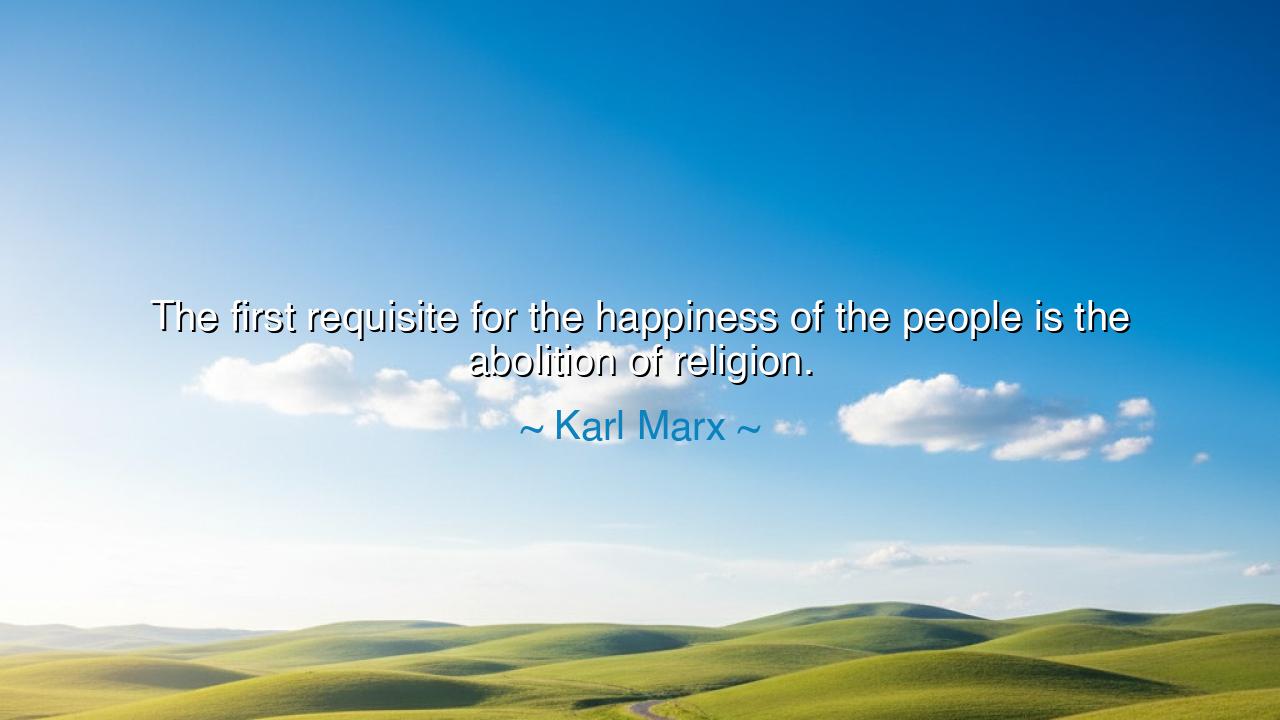
The first requisite for the happiness of the people is the






Karl Marx, the great critic of power and prophet of revolution, once declared: “The first requisite for the happiness of the people is the abolition of religion.” Few words have echoed through history with such intensity — words both revered and condemned, words that question not God Himself, but the chains forged in His name. In this statement, Marx does not speak of erasing the soul’s longing for the divine; he speaks of liberating the mind from the structures of control that have too often disguised themselves as holiness. He saw religion not as the light of truth, but as the veil that dimmed it — a comfort for suffering hearts that also, in his view, preserved their suffering.
To understand this quote, we must return to the age in which Marx lived — the nineteenth century, when Europe was torn between the old faith and the new age of reason. The Industrial Revolution had filled cities with smoke and poverty. The poor labored from dawn to night while the wealthy prayed in marble halls. Churches, allied with kings and empires, often preached endurance instead of justice — telling the starving that their reward awaited them in heaven, while their masters feasted on earth. In such a world, Marx saw religion not as a balm, but as a tool of oppression. “Religion,” he wrote elsewhere, “is the opium of the people” — a narcotic to dull the pain of injustice rather than cure it.
When Marx spoke of the abolition of religion, therefore, he meant the abolition of illusion — the removal of any system that keeps humanity submissive to earthly powers by promising heavenly compensation. He longed for a world where men and women would find happiness not in dreams of paradise, but in the building of justice upon the earth. For him, true freedom required the courage to look at reality as it is, not as it is preached. He believed that when people awaken from the dream of divine deliverance, they will at last see that their liberation lies in their own hands.
And yet, the depth of Marx’s statement reaches beyond mere politics. It is a call to spiritual maturity — to outgrow the need for false comfort, and to claim responsibility for one’s own fate. He believed that as long as humanity clings to illusions, it cannot be fully alive. This was not the arrogance of disbelief, but the fervor of one who yearned for human dignity to replace divine submission. In the ashes of superstition, he sought to plant reason, equality, and compassion — a moral order built by man for man, where faith in authority gives way to faith in humanity itself.
History offers us examples that illuminate both the truth and the peril in Marx’s vision. The French Revolution, born in a cry for liberty, sought to abolish the tyranny of both throne and altar. In their passion for reason, they tore down the cathedrals and raised the banner of human rights. Yet, when faith was replaced not by wisdom but by fanaticism, blood flowed through the streets of Paris. Likewise, in the twentieth century, nations that claimed to fulfill Marx’s dream abolished religion by force — and in doing so, they often erected new idols: the state, the leader, the party. Their error was not in seeking freedom from superstition, but in forgetting that the human spirit still needs meaning, mercy, and love.
For Marx was right in one thing beyond all doubt — that no people can be happy while living in chains, whether those chains are of iron or of belief. But to abolish religion is not enough; one must also replace fear with understanding, and dependence with moral awakening. The truest liberation is not merely to reject the gods of the past, but to awaken the godlike potential within oneself — the ability to create, to think, to love without coercion. This is what Marx sought, though his followers often mistook the light of liberation for the fire of destruction.
So, my listener, let us take from this teaching not a call to war against faith, but a call to question every system that numbs the soul. Do not surrender your conscience to tradition, nor your hope to authority. Seek truth not because others command it, but because your heart demands it. Let no creed — religious or political — prevent you from seeing the suffering of the world or from working to heal it. For the happiness of the people does not lie in abolishing God, but in abolishing the fear, ignorance, and injustice that have so often worn His name. Only then, when man stands upright and unafraid, will the true kingdom of happiness — the kingdom built by human hands and human hearts — come into being.






AAdministratorAdministrator
Welcome, honored guests. Please leave a comment, we will respond soon